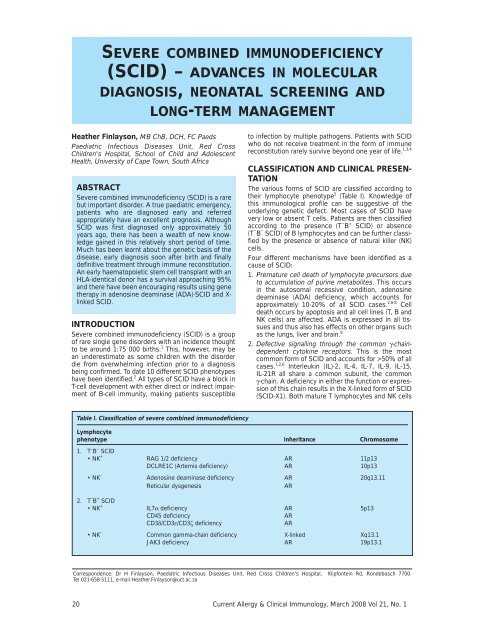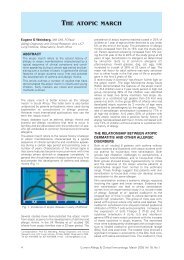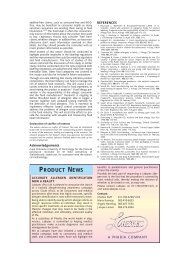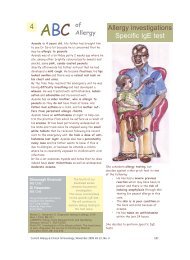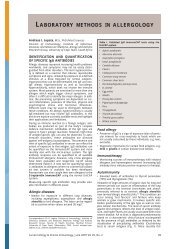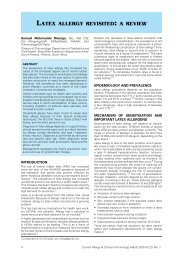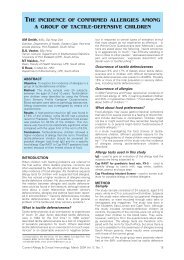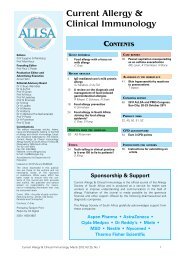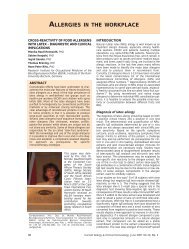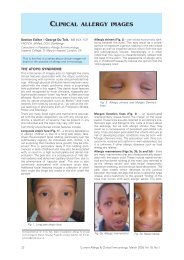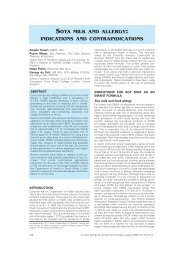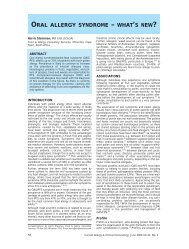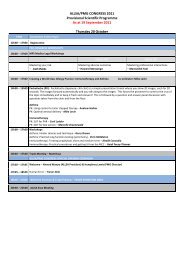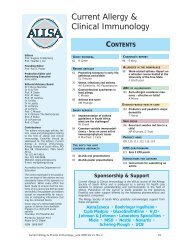Current Allergy and Clinical Immunology - March 2008
Current Allergy and Clinical Immunology - March 2008
Current Allergy and Clinical Immunology - March 2008
You also want an ePaper? Increase the reach of your titles
YUMPU automatically turns print PDFs into web optimized ePapers that Google loves.
SEVERE COMBINED IMMUNODEFICIENCY(SCID) – ADVANCES IN MOLECULARDIAGNOSIS, NEONATAL SCREENING ANDLONG-TERM MANAGEMENTHeather Finlayson, MB ChB, DCH, FC PaedsPaediatric Infectious Diseases Unit, Red CrossChildren's Hospital, School of Child <strong>and</strong> AdolescentHealth, University of Cape Town, South AfricaABSTRACTSevere combined immunodeficiency (SCID) is a rarebut important disorder. A true paediatric emergency,patients who are diagnosed early <strong>and</strong> referredappropriately have an excellent prognosis. AlthoughSCID was first diagnosed only approximately 50years ago, there has been a wealth of new knowledgegained in this relatively short period of time.Much has been learnt about the genetic basis of thedisease, early diagnosis soon after birth <strong>and</strong> finallydefinitive treatment through immune reconstitution.An early haematopoietic stem cell transplant with anHLA-identical donor has a survival approaching 95%<strong>and</strong> there have been encouraging results using genetherapy in adenosine deaminase (ADA)-SCID <strong>and</strong> X-linked SCID.INTRODUCTIONSevere combined immunodeficiency (SCID) is a groupof rare single gene disorders with an incidence thoughtto be around 1:75 000 births. 1 This, however, may bean underestimate as some children with the disorderdie from overwhelming infection prior to a diagnosisbeing confirmed. To date 10 different SCID phenotypeshave been identified. 2 All types of SCID have a block inT-cell development with either direct or indirect impairmentof B-cell immunity, making patients susceptibleto infection by multiple pathogens. Patients with SCIDwho do not receive treatment in the form of immunereconstitution rarely survive beyond one year of life. 1,3,4CLASSIFICATION AND CLINICAL PRESEN-TATIONThe various forms of SCID are classified according totheir lymphocyte phenotype 5 (Table I). Knowledge ofthis immunological profile can be suggestive of theunderlying genetic defect. Most cases of SCID havevery low or absent T cells. Patients are then classifiedaccording to the presence (T – B + SCID) or absence(T – B – SCID) of B lymphocytes <strong>and</strong> can be further classifiedby the presence or absence of natural killer (NK)cells.Four different mechanisms have been identified as acause of SCID:1. Premature cell death of lymphocyte precursors dueto accumulation of purine metabolites. This occursin the autosomal recessive condition, adenosinedeaminase (ADA) deficiency, which accounts forapproximately 10-20% of all SCID cases. 2,6-8 Celldeath occurs by apoptosis <strong>and</strong> all cell lines (T, B <strong>and</strong>NK cells) are affected. ADA is expressed in all tissues<strong>and</strong> thus also has effects on other organs suchas the lungs, liver <strong>and</strong> brain. 92. Defective signalling through the common γ-chaindependentcytokine receptors. This is the mostcommon form of SCID <strong>and</strong> accounts for >50% of allcases. 1,2,6 Interleukin (IL)-2, IL-4, IL-7, IL-9, IL-15,IL-21R all share a common subunit, the commonγ-chain. A deficiency in either the function or expressionof this chain results in the X-linked form of SCID(SCID-X1). Both mature T lymphocytes <strong>and</strong> NK cellsTable I. Classification of severe combined immunodeficiencyLymphocytephenotype Inheritance Chromosome1. T – B – SCID• NK + RAG 1/2 deficiency AR 11p13DCLRE1C (Artemis deficiency) AR 10p13• NK – Adenosine deaminase deficiency AR 20q13.11Reticular dysgenesisAR2. T – B + SCID• NK + IL7α deficiency AR 5p13CD45 deficiencyARCD3δ/CD3ε/CD3ζ deficiencyAR• NK – Common gamma-chain deficiency X-linked Xq13.1JAK3 deficiency AR 19p13.1Correspondence: Dr H Finlayson, Paediatric Infectious Diseases Unit, Red Cross Children's Hospital, Klipfontein Rd, Rondebosch 7700.Tel 021-658-5111, e-mail Heather.Finlayson@uct.ac.za20 <strong>Current</strong> <strong>Allergy</strong> & <strong>Clinical</strong> <strong>Immunology</strong>, <strong>March</strong> <strong>2008</strong> Vol 21, No. 1


